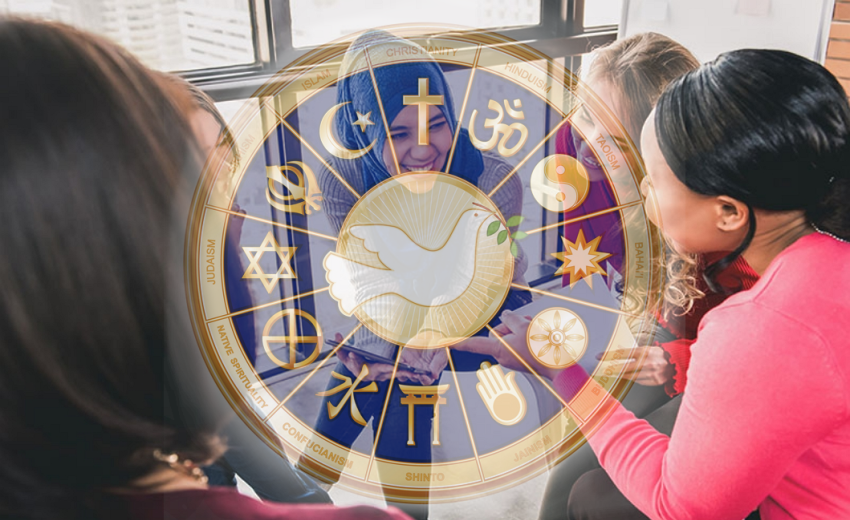Violence against women is a human rights violation and knows no national, cultural or faith barriers. The International Day for the Elimination of Violence against Women launched sixteen days of activism ending on friday, December 10th, International Human Rights Day. It was established by the United Nations to fight against "any act of gender-based violence that results in, or is likely to result in, physical, sexual, or mental harm or suffering to women".
Women of faith are sometimes even doubly persecuted, firstly for being women and secondly, and possibly even more disturbingly, within the traditions and practices of their own faith groups.
As six women, each from one of the world’s major faith communities, we reject all violence against women within the context of human rights. Moreover, we believe that our faith traditions, at their core, specifically preclude the violation of human rights for women.
We are reminded that Sikh Gurus raised their voice against injustice and violence towards women in medieval India, and instead championed the centrality of women in society and the need to respect and value them:
“From woman, man is born; within woman, man is conceived; to woman he is engaged and married. Woman becomes his friend; through woman, the future generations come. When his woman dies, he seeks another woman; to woman he is bound. So why call her bad? From her, kings are born. From woman, woman is born; without woman, there would be no one at all.” (Guru Granth Sahib Ang 473)
In the Hebrew Bible, Genesis tells the story of the very beginning of humankind. Women and Men, it asserts were made equal in the sight of God, each created in God’s image.
“So God created the human beings in the (divine} image, creating (them) in the image of God, creating them Male and Female” (Genesis 1:26-28)
The Jewish husband’s traditional obligations to his wife were extensive, including her right to food, clothing, and sexual relations, medical expenses when ill, ransom if taken captive, burial, and the right to maintenance and to remain on his property as a widow.
In the New Testament, the basis of Christianity, the Apostle Paul wrote to the Church in Colossae (3:19) with advice specifically to men about how to treat and revere their wives:
“Husbands, love your wives [with an affectionate, sympathetic, selfless love that always seeks the best for them] and do not be embittered or resentful toward them [because of the responsibilities of marriage].”
The Qur’an too, states that the relationship between man and wife is based on tranquility, unconditional love, tenderness, protection, encouragement, peace, kindness, comfort, justice and mercy.
“O mankind we have created you from a single male and female and have made you into nations and tribes so that you might come to know one another” (Al Hujurat 49:13).
The partnership between men and women and their interdependence, is reflected in Hindu scripts:
“In other words, the wife must remain embraced by her husband. Thus she becomes beloved and well protected. Just as one saves his money and places it under his own personal protection, one should similarly protect his wife”. (Srimad Bhagavatam 4.26.17)
And in Islam: “They (wives) are garments for you while you are garments for them”. (Quran 2:187)
We, as Christian, Muslim, Hindu, Sikh and Jewish women believe that our faith teachings give us a moral and also a religious responsibility, based on ancient scriptures, to stand up against all forms of violence specifically those against women. We recognise, however, that although our respective faith groups, at their core, preach messages of women’s equality and human rights for all, tragically these commandments have not always translated into practice. This remains true today, often leading to the misinterpretation or selective reading of scriptures and the ongoing subjugation of women, even in the modern, democratic world.
On this International Human Rights Day in particular, we call upon governments, faith leaders, community activists, families and individuals, to advocate for an end to violence against women and also against all humanity, irrespective of sex, gender or belief. We are each, after all, God’s beloved creation.
“Let all abide in peace” (Guru Granth Sahib Ang 74)
The Women’s Faith Forum
The Women’s Faith Forum is a collection of high-profile women from across the major faith groups who inform policy, faith leadership and community leaders, at all levels of political and civic society.
Motivated by our faith traditions we are inspired to live, work and to be known as women of faith. Between us from Islam, Sikhism, Hinduism, Christianity and Judaism we bring our different theologies, traditions, cultural norms, worship practices, ways of living and serving in our communities. There is much in common that we share yet our diversity provides opportunities to learn, particularly about the vital roles that women play both in our own faith communities and, on their behalf, in wider society. As women leaders in our faith groups, we have the opportunity to listen into thousands of families and community conversations. Through our networks we have ready access to the views and experiences of countless women, and men.
The Women’s Faith Forum will enable the voices of women throughout the UK - their hopes, fears, beliefs and ambitions to shape positive societal change – to be heard. We can ensure that the experiences, skills and dedication of women both in faith communities and beyond are focused on the key issues of today, including the pandemic and its impact.
To this end, the Forum is inviting policy makers, influencers and civil society organisations to engage with us, to listen and to embrace authentic inclusivity.
Dr Husna Ahmad OBE
Marcia Dixon MBE
Joy Madeiros
Bijal Majithia
Laura Marks OBE
Contact
[email protected]
07793056248

